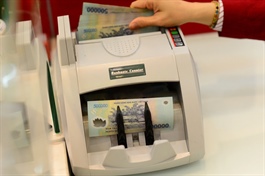E-commerce platforms may be asked to pay taxes on behalf of sellers
E-commerce platforms may be asked to pay taxes on behalf of sellers
The General Department of Taxation has proposed that e-commerce platforms declare and pay taxes on behalf of sellers as part of an effort to enhance tax management on e-commerce businesses.

A comprehensive database and application of information technology is the key to improving the efficiency of the tax management on e-commerce in the context that e-commerce is developing quickly. — VNA/VNS Photo Phạm Hậu |
Nguyễn Thị Lan Anh, director of the Tax Administration Department on Small and Medium Enterprises and Business Households, Individuals, said at an online forum held by the Government’s e-portal that the proposal would enhance the responsibility of e-commerce platforms while easing administrative procedures and reducing compliance costs.
"Requiring e-commerce platforms to declare and pay taxes on behalf of sellers is feasible because the platforms own information about sellers' successful transactions, revenues and fees," she said.
Internationally, the World Bank and the Organisation for Economic Co-operation and Development (OECD) have shown that e-commerce and digital platforms can declare and pay taxes on behalf of sellers, as several countries - such as Belgium, Uruguay and some states in the US - have required them to do so to reduce compliance costs and improve tax management efficiency, according to the director.
Regulations on collecting data from e-commerce platforms and foreign digital platforms are also often applied around the world. In China, e-commerce platforms must supply information about transactions and other relevant information to tax management agencies.
The tax watchdog will continue to gather data on e-commerce from various sources and apply AI in data processing to enhance risk-based management.
Database development

Goods parcels sorted at a centre of Viettel Post. The e-commerce market in Việt Nam has been growing rapidly over the past decade. — VNA/VNS Photo Minh Quyết |
A comprehensive database and the application of information technology are key to improving efficiency in tax management for e-commerce in the context that e-commerce is developing quickly, according to Anh.
She noted that the e-commerce market in Việt Nam had been growing rapidly over the past decade, at an annual growth rate of 20 to 25 per cent, from US$2.2 billion 10 years ago to $20.5 billion in 2023, accounting for eight per cent of total retail sales of goods and services. It is expected that e-commerce will make up to 10 per cent of the total retail sales in 2025.
In that context, data sharing and compatibility among relevant management agencies become critical.
The General Department of Taxation is working with the Ministry of Industry and Trade to develop a shared database for e-commerce platforms and owners at the portal online.gov.vn.
"However, a major challenge is dealing with different criteria for data on various management agencies due to their diverse management purposes," Anh said, urging coordination to make data compatible from an early stage for better management efficiency.
According to Trần Minh Tuấn, director of the Department of Digital and Social Economy under the Ministry of Information and Communications, important databases for e-commerce management include invoices, platforms and sellers, payment systems, delivery services, population and technology providers.
Coordination between relevant ministries and agencies, including the Ministry of Finance, the Ministry of Industry and Trade, the State Bank of Việt Nam, the Ministry of Information and Communications and the Ministry of Public Security, is therefore necessary to develop a comprehensive database that is correct, clean and live.
It is also critical to develop the data infrastructure system to catch up with the rapid development of e-commerce.

A shipper delivers parcels of goods. Tax on e-commerce business has been put under scrutiny. — VNA/VNS Photo Xuân Tư |
Trần Mạnh Nam, from Vietnam Payment Solution Joint Stock Company (VNPAY), said that while the development of a large database was critical, it would be very complicated.
It was impossible to expect the system to be optimal from the beginning, but its development could be divided into different stages, he noted.
VAT on small-value imported items
As for a proposal of collecting value added tax on small-value items that are crossing the border into Việt Nam, economic expert Định Trọng Thịnh said improving the policy framework is pressing.
Thịnh cited statistics from the Ministry of Information and Communications showing that up to $1.9 billion of small-value goods are imported every month from January to June, resulting in a huge tax loss.
Many countries, including the UK and Thailand, are imposing tax on small-value items, according to Thịnh.
Tax director Anh said the idea of collecting tax on small-value imported goods had already been proposed to the Government.
The Ministry of Finance also sent proposed amendments to regulations on invoices to the Government suggesting that e-commerce platforms should be able to issue invoices for every transaction, no matter how small.
Issuing invoices fully would also help improve transparency in product origins, prevent counterfeit and low-quality goods in the market, protect the rights of consumers and create a healthy competitive market, she said.
Anh also stressed that it was necessary to raise regulations to ensure fairness among market participants, especially on cross-border e-commerce, to encourage the development of both domestic and foreign businesses.
To facilitate tax payments for individuals and business households, she said that an e-portal was being developed to allow them to declare and pay taxes on their revenues from transactions via social networks.
Statistics show that tax revenues from e-commerce increased from VNĐ83 trillion ($3.37 billion) in 2022 to VNĐ97 trillion ($3.93 billion) in 2023.
In the first seven months of this year, tax collection from e-commerce reached more than VNĐ78 trillion ($3.16 billion).




























